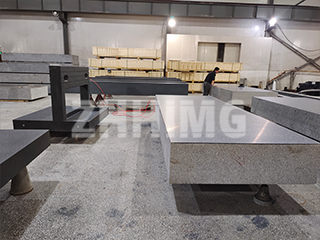In recent years, the use of granite inspection platforms and measuring tools has increased significantly, gradually replacing traditional cast iron gauges in many fields. This is primarily due to granite’s adaptability to complex on-site working environments and its ability to maintain high precision over time. It not only effectively ensures accuracy during processing and testing, but also improves the quality of the finished product. The hardness of granite inspection platforms rivals that of high-quality tempered steel, and their surface precision often exceeds that of other common materials.
Made from high-quality natural black granite, granite inspection platforms undergo meticulous manual processing and repeated finishing, resulting in a smooth surface, a dense and uniform structure, and excellent stability. They are hard and strong, and are rust-resistant, acid- and alkali-resistant, non-magnetic, non-deteriorating, and highly wear-resistant. They maintain stability at room temperature and under heavy loads, making them ideal precision reference measuring tools and widely used for calibrating the accuracy of testing instruments, precision tools, and mechanical components. Particularly in high-precision measurement applications, granite platforms, due to their unique properties, far surpass cast iron plates.
Compared to ordinary stone, granite inspection platforms offer the following advantages:
Non-deformation: They offer exceptional hardness, wear resistance, and high-temperature resistance.
Physically stable: They have a dense and uniform structure, resulting in burrs on the surface when impacted, which does not affect surface accuracy. They are easy to maintain and maintain accuracy over time, are rust-resistant, anti-magnetic, and insulated.
Natural aging: After millions of years of natural aging, internal stresses are completely released, resulting in an extremely low linear expansion coefficient, excellent rigidity, and resistance to deformation.
Corrosion resistance: They are resistant to acid and alkali corrosion, require no oiling, and are dust-resistant, making maintenance easy and ensuring a long service life.
Stable measurement: They are scratch-resistant and are not restricted by constant temperature environments, maintaining high measurement accuracy even at room temperature.
Non-magnetic: They move smoothly during measurement without stagnation and are unaffected by moisture.
Thanks to these superior properties, granite inspection platforms have become an indispensable tool in modern precision measurement and quality control.
Post time: Sep-08-2025

